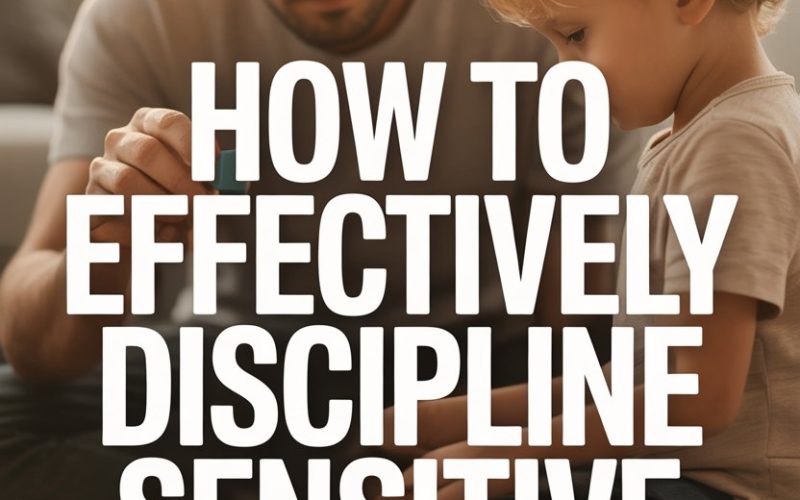Raising a sensitive child can feel a bit like being entrusted with a Ming vase in a bumper car arena.
Yes, you get to witness their tender hearts and their uncanny ability to spot a wilting flower or an off-key note in a lullaby.
But when it comes to discipline? Suddenly, every gentle correction seems to threaten the kind of meltdown usually reserved for reality TV.
Take heart: sensitive kids aren’t broken, nor do they need coddling into adulthood. They simply require a slightly different approach—one that helps them learn, rather than shutting down or crumbling under pressure.
Here’s how you can guide your sensitive child through the rough patches, without turning your home into a never-ending emotional episode of EastEnders.
Why Sensitive Kids React Differently
For some children, a stern glance is all it takes to trigger a flood of tears. This isn’t because they’re manipulative or dramatic; they may just experience emotions more intensely, thanks to a more reactive nervous system.
A study published in Development and Psychopathology found that highly sensitive children process sensory input and emotional cues with greater depth, making them more tuned in—and more easily overwhelmed—by correction or conflict.
The result? Discipline strategies that work wonders for other kids—like time-outs or raised voices—can backfire spectacularly, leading to shame, withdrawal, or anxiety.
Get to Know Your Child’s Triggers
Every child has a few buttons that, when pressed, launch them into orbit. Sensitive kids often have a whole control panel.
Loud voices, criticism in front of others, abrupt changes to routine—all can trigger outsized reactions.
Try to spot patterns. Does your child tense up when you mention their mistake in front of their siblings? Do they seem undone after a busy, noisy day?
Note these triggers and—if possible—talk about them during calm moments. You might be surprised what insights your child can share when you ask gently, “Hey, what makes you feel really upset or embarrassed?”
Connection Before Correction
Sensitive kids respond best when they feel understood—not just told off. Before addressing an issue, take a moment to connect.
This can be as simple as kneeling to their eye level, placing a hand on their shoulder, or offering a soft “Looks like you’re having a tough time.”
Clinical psychologist Dr. Laura Markham explains on Aha! Parenting that children are more receptive to guidance when they feel respected and acknowledged.
It’s a bit like topping up their emotional bank account before making a withdrawal.
Swap Shame for Curiosity
Shame is kryptonite for sensitive kids. Traditional punishments—raised voices, public call-outs, even the dreaded “I’m so disappointed”—often leave them spiraling. Instead, swap judgement for curiosity.
Instead of, “Why did you do that?!” try, “Hmm, it seems like you had a hard time with that. What happened?” This subtle shift invites conversation rather than confrontation.
Your child feels seen, not shamed, which makes them far more likely to open up about what went wrong (and how to fix it next time).
Set Clear, Calm Boundaries
Gentle doesn’t mean permissive. Sensitive kids still need boundaries—possibly more so, because ambiguity can feel especially overwhelming to them.
Be clear and specific: “Shoes stay by the door,” works better than “Stop making a mess.” Keep your tone even, your volume steady, and your expectations consistent.
When a line is crossed, state what needs to change rather than piling on emotion: “It’s not okay to hit when you’re angry. Let’s take some deep breaths.”
Children who know what to expect feel safer, and that sense of safety makes discipline more effective.
Validate, Don’t Dismiss, Big Feelings
Imagine you’re told “Don’t be so sensitive!” every time you feel upset. Not very helpful, right? Sensitive kids often hear this message, directly or indirectly, which teaches them to bottle up feelings or be ashamed of them.
Instead, acknowledge those big emotions: “It really upset you when your tower fell over, didn’t it?” This act of validation doesn’t reward misbehavior—it simply lets your child know you see and accept their feelings.
Once their emotional storm has passed, you can talk about what to do differently next time.
Use Natural Consequences Whenever Possible
Sensitive kids tend to learn best from real-world results rather than imposed punishments. For example, if your child refuses to wear a coat and ends up shivering at the park, that chilly experience will stick far longer than a stern lecture.
Natural consequences are both instructive and—mercifully—devoid of parental drama. They let your child connect the dots themselves, building resilience and problem-solving skills along the way.
Of course, safety comes first. Don’t let your child discover the consequences of running into traffic, obviously.
Teach Emotional Regulation Tools
Discipline isn’t just about pointing out what went wrong. It’s also a chance to teach new skills. Sensitive children often need extra support learning how to ride the waves of their own emotions.
Try introducing simple emotional regulation techniques: deep belly breathing, squeezing a stress ball, drawing feelings on paper, or even stomping feet safely to release big energy.
The more tools you give your child, the better equipped they’ll be when overwhelm creeps in.
Consider practicing these skills when your child is calm, not in the heat of the moment. That way, their well-practiced “cool down” routine will be ready when it’s truly needed.
Avoid Power Struggles
Sensitive kids are sometimes world-class negotiators—possibly because the stakes feel so high to them emotionally. If you find yourself in a tug-of-war over who gets the blue cup, take a step back.
Pick your battles. Not every hill is worth dying on, especially if it leads to a cycle of escalation. When possible, offer two acceptable choices: “Would you like to brush your teeth before or after your bath?”
This strategy gives your child a sense of control within boundaries you’re comfortable with.
If a standoff still erupts, keep calm and repeat your limits kindly but firmly. Your consistency will speak volumes.
Repair After Rough Moments
No parent gets this right every time. Sometimes you’ll snap, sometimes your child will unravel completely. What matters most is what happens next.
Apologize sincerely if you lost your cool. Model the kind of “owning up” you want to see in your child: “I was frustrated and raised my voice. That wasn’t helpful. Next time I’ll try to stay calm.”
When your child feels safe coming to you after a meltdown, they learn they’re loved—even when things get messy.
Repair builds trust and teaches sensitive kids that mistakes (theirs and yours) are chances to grow, not proof of being “bad.”
Watch for Signs of Overwhelm
Sensitive kids can only handle so much before their internal “cup” overflows. Watch for signs that your child is approaching their limit: glazed eyes, sudden irritability, zoning out, or a quiet withdrawal from activities.
This might mean it’s time for a break, a snuggle, or just a few quiet minutes away from the action.
Prevention trumps correction every time. If you sense your child’s fuse is short, shift gears before a meltdown erupts. It’s a bit like heading off a thunderstorm by closing the windows—much tidier.
Put Your Own Oxygen Mask On
Guiding a sensitive kid through their daily ups and downs isn’t for the faint of heart. If your own stress levels are teetering, your patience will evaporate faster than morning dew in August.
Carve out slivers of time for yourself when you can. Breathe. Phone a mate. Eat a biscuit in the loo with the door locked—whatever it takes.
Your emotional steadiness acts as your child’s anchor.
If you’re struggling, connecting with other parents or a trained therapist can work wonders. No one should have to white-knuckle sensitive kid parenting alone.
When to Seek Extra Support
Some sensitive kids have a level of emotional reactivity that goes beyond temperament and may be signs of anxiety, sensory processing issues, or other underlying conditions. Trust your gut.
If your child’s emotional storms routinely derail daily life, or if you see signs like extreme withdrawal, aggression, or lasting sadness, reach out to a pediatrician or child psychologist.
Early support can make a world of difference, both for your child and your own peace of mind. You aren’t failing your child—far from it. You’re getting them tools for a happier, healthier future.
Sensitive Doesn’t Mean Fragile
Sensitive kids aren’t destined for a lifetime of tiptoeing through daffodils, unable to handle the world’s rough edges.
With the right discipline strategies, they become some of the most empathetic, resilient, and emotionally intelligent adults you’ll ever meet.
Every patient boundary, every moment of repair, every time you choose connection over correction—you’re shaping your sensitive child’s future.
And you’re doing a cracking job, even on the days when nobody is convinced (least of all you).
Cup of tea, anyone?





